- Home
- Joel C. Rosenberg
The Jerusalem Assassin Page 4
The Jerusalem Assassin Read online
Page 4
Finally, in near desperation, Marcus shot his right arm up. He grabbed the back of the shooter’s head, yanked it forward, and head-butted him as hard as he could. Then he drove his left thumb into the man’s eye socket and squeezed. Marcus could barely hear the screams over the bells, but he could feel the man’s body convulse and his head snap back, and in that instant, Marcus regained the freedom of movement he so badly needed.
Swiveling his hips and throwing his right leg violently to the left, Marcus managed to throw the shooter off-balance just enough for him to maneuver his back up off the steel hatch. From there, Marcus heaved his torso forward. The moment he reached an upright position, he grabbed the rifle, still strapped to his back, and swung it around with all the force he could muster. The butt of the rifle smashed directly into the man’s nose. Marcus felt the cartilage implode. Blood sprayed everywhere, but Marcus wasn’t finished. He flipped the man onto his stomach and smashed the butt of the rifle into the back of his neck. His face crashed into the steel hatch. Then, just as the bells stopped ringing, Marcus whipped the gun around, drove the barrel into the back of the man’s left knee, and pulled the trigger. An instant later, he fired the gun into the back of the man’s right knee. The sound of the two explosions echoed across the city, and as suddenly as it had all begun, it was over.
The man went limp. He was unconscious and bleeding profusely, and he wouldn’t be walking again anytime soon, but he was alive. Marcus staggered backward, leaned against the inner wall of the tower, and fought to catch his breath. Finally he pulled out his phone and called Kailea.
“Shooter down,” he said between gasps. “But alive. Get the medics up here.”
“Will do,” she said. “And then you’d better get back down here.”
“Why? What happened?”
“I’m afraid I’ve got some bad news.”
Marcus feared what she was going to say but made her say it anyway.
“Mrs. Emerson was wounded,” Kailea said after a long pause. “They’re taking her right into surgery.”
Marcus winced. “And Carter?”
There was another long pause. “I’m sorry, Marcus,” she finally said. “He didn’t make it.”
9
THE PRESIDENTIAL PALACE, NOVO-OGARYOVO, RUSSIA
The twin-turbine Mi-8 helicopter touched down at almost 8 p.m. local time.
Even before its rotors had finished spinning, Nikolay Kropatkin bolted out the side door, briefcase in hand. With three members of his security detail flanking him, the forty-two-year-old acting director of the FSB raced up a freshly shoveled and salted pathway from the helipad to the back entrance of the personal residence of the newly installed Russian leader.
Once inside, Kropatkin was searched by members of the presidential security detail and asked to step through a magnetometer. His briefcase was put through an X-ray machine, and its contents were thoroughly searched by hand. Only then was he allowed to proceed, escorted by the chief of protocol. His detail stayed behind. Following the triple assassinations of Russia’s president, prime minister, and the former head of the FSB a little more than a month earlier, security procedures had been tightened considerably. No longer were any exceptions made. Not even for family or the president’s most trusted advisors.
Working their way down the immense marble hallways of the sprawling palace—reportedly built for a cost of some $200 million (though Kropatkin knew the real figure was nearly twice that much)—the intelligence chief was surprised to see that they were not headed to the administrative wing but to the residential wing. He soon noticed the scent of chlorine and could feel the humidity in the air increase considerably. Kropatkin was led through a set of double doors and found himself standing before an Olympic-size indoor pool. A lone figure was methodically doing laps while six large and heavily armed men in business suits stood watchful and tense.
“Nikolay Vladimirovich, come, join me. The water is warm.” The baritone voice of Mikhail Petrovsky boomed and echoed across the cavernous domed annex.
Kropatkin demurred.
Petrovsky finished his lap and bounded out of the water, grabbed a fresh towel from a nearby stack, and dried off his face and dark-brown mop of hair. For a man rapidly approaching his sixty-fifth birthday, a man who not two months earlier was merely the nation’s minister of defense, Petrovsky was in remarkably good physical shape. He not only swam a hundred laps a day, he also ran upwards of ten kilometers every other day.
“So what brings the nation’s top spy for such an urgent visit on a cold and forbidding night—a Sunday, no less?” the Russian president asked as he wrapped a towel around his waist.
“Marcus Ryker,” Kropatkin said.
“The American?”
“Yes, sir.”
“Please tell me he’s dead.”
“Sorry, but no, Mikhail Borisovich.”
“Then what?”
“Ryker is back in the news—a hero, it would seem.”
“What are you talking about?”
“Details are sketchy, but a few hours ago, two men entered a church building in Washington, D.C., and began shooting up the place. Police were called. They were on their way. But it seems that Ryker and a woman were nearby and decided not to wait. They headed into the church, killed one of the shooters, and incapacitated the other. The media isn’t reporting the name of the woman, but Marcus Ryker is now the lead story on every news service in the world.”
“Incapacitated?” Petrovsky asked. “Meaning what?”
“Ryker blew the guy’s kneecap off. Actually, he blew them both off.”
“Was it a terrorist operation or something local?”
“It’s not clear yet—the investigation is just getting under way.”
“Then why come all the way out here to tell me?” the president asked as he headed into a locker room.
Kropatkin followed. “There’s more to the story, sir. A senior American official was attending the church when the shooting began.”
“Who?”
“Janelle Thomas—she was the deputy secretary of state.”
“Was?”
“They killed her,” Kropatkin said.
“Why was she there?”
“Reuters is reporting she was a member of the church. Lived close by. Attended every Sunday she was in town.”
“Was she the target?”
“Hard to say. Early reports say the shooters were skinheads, fascists from the southern United States who hate blacks, Jews, and Muslims. Thomas was black, but so are most of the people who attend the church.”
“I still don’t understand why you couldn’t have told me all this in our regular briefing tomorrow,” Petrovsky said.
“It’s Ryker. Reuters is also reporting that he now works for DSS.”
“What’s that?”
“The Diplomatic Security Service,” Kropatkin replied. “It’s a branch of the State Department, responsible for protecting American foreign service officers, embassies, consulates, and the like.”
“I don’t understand,” said Petrovsky, still toweling off. “Didn’t the American president assure me just a few weeks ago that Ryker was a private citizen, that he was retired, on his own, with no government ties whatsoever?”
“He did, sir—and that’s my point. Clarke also told you that Ryker couldn’t have had anything to do with the assassinations here. He insisted that Ryker left Moscow with Senator Dayton’s entourage, flew back to Washington, and had to be hospitalized with some mysterious illness. Now, suddenly, Ryker’s well enough to be a federal agent, take down bad guys, and get his face plastered all over the news?”
“Clarke was lying to me?”
“I don’t know, sir, but something isn’t right.”
“No, it’s not—find out what, Nikolay Vladimirovich, and do it quickly.”
10
THE RESIDENCE OF THE GRAND AYATOLLAH, TEHRAN, IRAN
“My sons, I have something very difficult to tell you.”
It was nea
rly midnight when Hossein Ansari dropped the bombshell.
“I am afraid my days have come to an end.”
No one spoke. The Supreme Leader’s inner circle simply stared at their octogenarian spiritual guide in disbelief. As ever, he was dressed in his signature brown flowing robe and black turban. He sat on a mound of pillows covered with thick wool blankets. He had not looked well for some time. Tonight, he looked much worse. His skin was pale and slightly jaundiced. He had lost weight in the past week. His typically neatly trimmed gray beard now looked unkempt, even a bit wild, and the pale-blue eyes behind his wire-rimmed glasses had never looked more tired.
They had assumed his health had been affected by a series of wrenching setbacks, beginning with the triple assassination in Moscow just over six weeks earlier that had taken the lives of Tehran’s three most trusted Russian allies. This had been closely followed by disaster in the East China Sea. They were all reeling from these events, and the initial shock had eventually morphed into searing rage. For none of them was this truer than for Ansari, but he was now suggesting something worse was at play.
“Over the summer I received some disappointing news,” Ansari said without emotion. “I was diagnosed with pancreatic cancer. Stage four. My oncologists advised me that surgery and chemotherapy were options. But they caught it late. Neither of these measures will spare me from the inevitable. They would merely prolong my agony, and thus I have chosen to decline such treatment.”
The chamber remained eerily quiet.
Ansari continued. “My sons, I have no more than two months to live, if that. But I want you to know how deeply I cherish you all. We have been through a great deal. Together, we have carried on the Revolution in a manner, I believe, that would have made Imam Khomeini proud of us—very proud indeed.”
Ansari suddenly lapsed into a coughing fit. He waved off their efforts to assist him. Rather, he reached for a nearby cup of tea, took a sip, then set it down again and wiped his mouth with a handkerchief.
“We have accomplished more than our adversaries could have imagined,” he said softly. “Our Persian kingdom has seized no fewer than four Arab capitals. Through our Hezbollah proxies in Lebanon, we have effectively gained control of Beirut. Through our Houthi proxies in Yemen, we have all but consolidated our control of Sana’a. As a result of our strategic alliance with Moscow, we have gained operational control of Damascus. And of course, with the withdrawal of the Great Satan from Iraq, and after an enormous investment of funds into our Shia brothers there, we have come to dominate if not yet completely control the fortunes of Baghdad. Allah has granted us tremendous—tremendous—success, and these are by no means our only gains. Our investments in Hamas have paid spectacular dividends in Gaza, as have our investments in Turkey and Qatar. These, as well as our efforts to drive nearly all of the Great Satan’s forces out of Afghanistan, I consider among my greatest joys. And yet there is one more objective I long to achieve before I go.”
As commander of the Iranian Revolutionary Guard Corps, Mahmoud Entezam sat directly across from the Supreme Leader, and he did not like what he was hearing. Only fifty-three, Entezam was the youngest general ever to run the IRGC. He had been repeatedly promoted to reward his many operational successes, and in this, he had taken great pride, as had his bride, who happened to be the ayatollah’s highly favored niece. However, the horrific events of the last months had been the most difficult of his entire life and career. After the catastrophe in the East China Sea, Entezam had immediately offered to resign. Privately, he had even contemplated taking his own life, so profound was his humiliation and his shame. Only the absolute insistence of the Supreme Leader that he in no way considered Entezam to blame for the Americans’ perfidy—along with his robust private assurances that Ansari was grooming Entezam to one day serve in high elected office in the regime, possibly even as president—had brought the IRGC commander back from the brink of despair and given him the strength to continue in the regime’s service.
But this stunning new development could change everything. The last thing they could afford right now was a power struggle if the nation’s Supreme Leader really was dying. The country’s economy was already far too fragile. Oil prices were too low and the American economic sanctions had taken a terrible, and continuing, toll. The regime was hemorrhaging cash. Inflation was spiking, as was the unemployment rate. Protests were breaking out all over the country. The people were demanding increased subsidies for bread—subsidies the government could not afford—and sweeping political liberalization the government would never accept.
In Entezam’s assessment, it was only the moral authority and unparalleled leadership skills of Hossein Ansari, honed over decades of palace intrigue and tectonic shifts in the geopolitical sphere, that kept the regime intact and the country from exploding in a full-scale civil war. What’s more, it was only Ansari’s raw political power that had kept Entezam from losing his job and possibly his head. He had long suspected other senior officials were gunning for him, especially now. What would happen when Ansari was gone?
11
If Ansari was truly dying, a succession battle was coming, the first in decades.
And as the old man’s thoughts drifted a bit, Entezam studied the faces of the wolves around him.
To his right was Yadollah Afshar. At sixty-one, the president of the Islamic Republic of Iran was a cruel and insanely ambitious man whom Entezam thoroughly despised. Yet he was beloved by the ayatollah and many of the mullahs, and Entezam wondered if the man—himself a Shia cleric who had studied in seminary in Qom under Ansari—might see himself as a potential successor to the Supreme Leader. That would be a disaster, but it could not be ruled out.
To Entezam’s left was Ali Mansur, the newly appointed deputy director of the IRGC. Having served with great distinction leading his fellow Revolutionary Guards in one battle after another against ISIS and al Qaeda forces in Syria, Mansur, too, was a favorite of the Supreme Leader. Only forty-one years old, he was tall, fit, strikingly handsome, happily married, and the father of five sons and two daughters. Mansur was without question an exceedingly capable soldier and intelligence operative. But he was not Entezam’s first choice as deputy commander. There were at least a dozen men under Entezam’s command who were more capable and more experienced—men he himself had trained, men who were loyal to him. Yet when the position became open, in a rare act of intervention, the Supreme Leader had quietly summoned Entezam to his chambers and requested, as a personal favor, that he elevate Mansur to the role.
It was all but unheard of to have the nation’s spiritual leader involve himself in such personnel decisions, and it immediately made Entezam suspicious. Why had Ansari made such a request? Did he have a connection to Mansur of which Entezam was unaware? Was it possible President Afshar was maneuvering a loyal ally into position before launching a decapitating strike against Entezam? The fact that Entezam had no idea bothered him all the more.
The only other man in the room was Dr. Haydar Abbasi. The Supreme Leader had asked the chief of the nation’s space and satellite directorate to brief him and the others on the tremendous progress Abbasi and his team were making on upgrading Iran’s long-range ballistic missiles, progress based entirely on stunning new test data from the North Koreans. Yet Abbasi was hardly a member of the inner circle. Why, then, would the ayatollah include him on a night when such important news was being revealed?
“Your Holiness, tell us what to do,” President Afshar said softly. “How can we help you finish your journey?”
The gesture evoked a smile—weak but most sincere—from the eighty-four-year-old leader of the Revolution. “Thank you, my son,” Ansari said, reaching for another sip of tea and swallowing with some difficulty. “I have summoned you to my private study, this place I have come to so love, to express to you all my dying wishes.”
“Whatever you ask, my lord, we will do it,” Entezam said before Afshar could.
“You are most kind,” Ansari replied. “
I have only three requests.”
Each man leaned forward to catch every word.
“First, above all else, you must promise me you will continue in earnest our quest for the Persian Bomb. Build it. Buy it. Steal it. But do not settle for a single weapon. You must acquire an entire arsenal—no matter the cost. Is this clear?”
They all nodded.
“Understand this: Iran will never be a great power—nor shall we ever resurrect the glory of the Persian Empire—until we have this ultimate power in our hands. We cannot annihilate the Americans or wipe the criminal Zionist entity off the map until we have this power. Nor can we ever hasten the coming of Imam al-Mahdi, peace be upon him . . .”
“Peace be upon him,” they repeated.
“. . . until we have the arsenal of the apocalypse in our hands. Never lose sight of this divine mission.”
All four men voiced their solemn assurances, Entezam loudest of all.
“Second, you must never allow the Palestinian people or their leaders to be lured into a false and final peace deal with the Zionists or the Americans. Never. Do not worry about our dear friend and brother Ismail Ziad. He has personally given me his oath. He will go to his grave without betraying our cause. We have paid him well. And I’ve assured him his widow and sons will be well paid too. But Ismail Ziad is an old man. Who will lead the Palestinian people after him? Will a warrior rise from the shadows to unify the people and lead them into an all-out jihad against the Zionists? Inshallah. Yet what if a Judas appears instead, ready to sell out his people for thirty pieces of silver? My sons, I fear that after Ismail’s departure from this life, a new leader will emerge who is exhausted by the conflict, mesmerized by the Zionists’ lies, bedazzled by the Americans’ bribes, and ready to undermine all we have prayed, worked, and prepared for. You must never let this happen.”

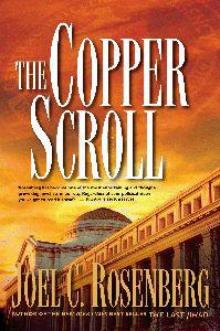 The Copper Scroll
The Copper Scroll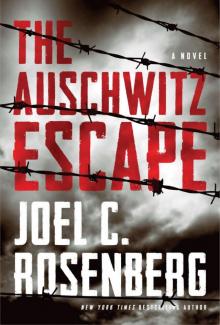 The Auschwitz Escape
The Auschwitz Escape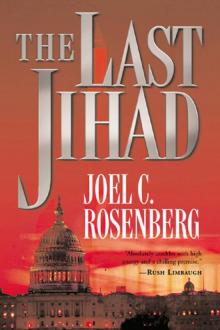 The Last Jihad
The Last Jihad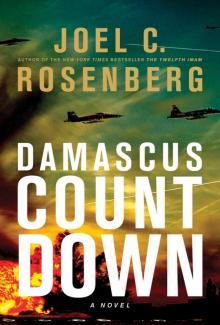 Damascus Countdown
Damascus Countdown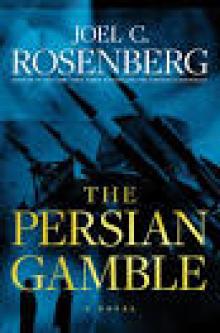 The Persian Gamble
The Persian Gamble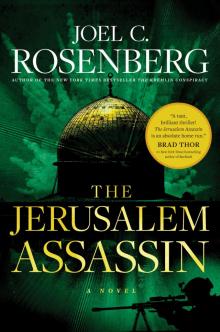 The Jerusalem Assassin
The Jerusalem Assassin Dead Heat
Dead Heat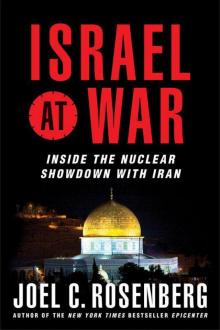 Israel at War: Inside the Nuclear Showdown With Iran
Israel at War: Inside the Nuclear Showdown With Iran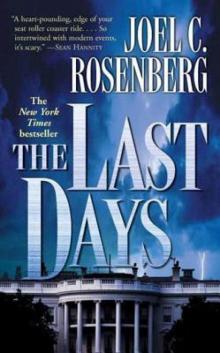 The Last Days
The Last Days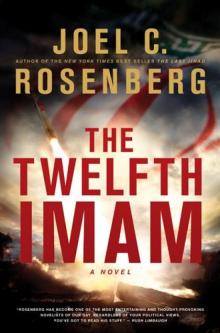 The Twelfth Imam
The Twelfth Imam Epicenter 2.0
Epicenter 2.0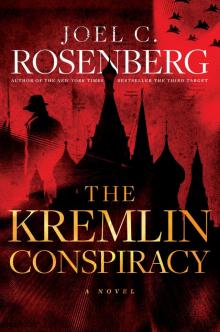 The Kremlin Conspiracy
The Kremlin Conspiracy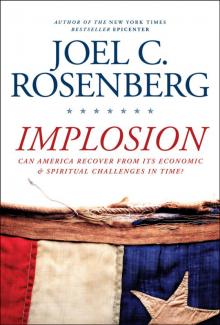 Implosion: Can America Recover From Its Economic and Spiritual Challenges in Time?
Implosion: Can America Recover From Its Economic and Spiritual Challenges in Time?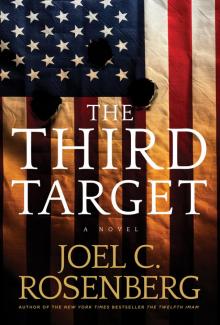 The Third Target: A J. B. Collins Novel
The Third Target: A J. B. Collins Novel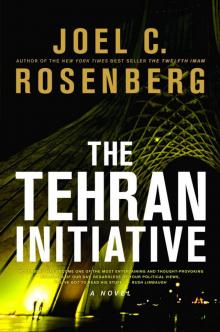 The Tehran Initiative
The Tehran Initiative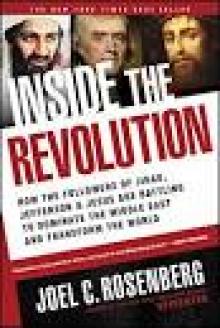 Inside the Revolution
Inside the Revolution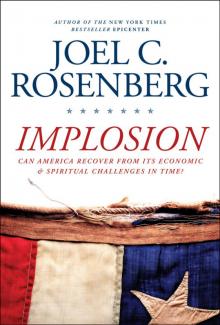 Implosion
Implosion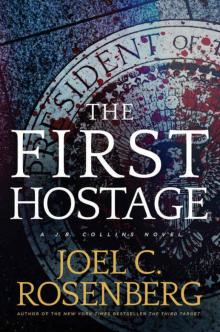 The First Hostage: A J. B. Collins Novel
The First Hostage: A J. B. Collins Novel